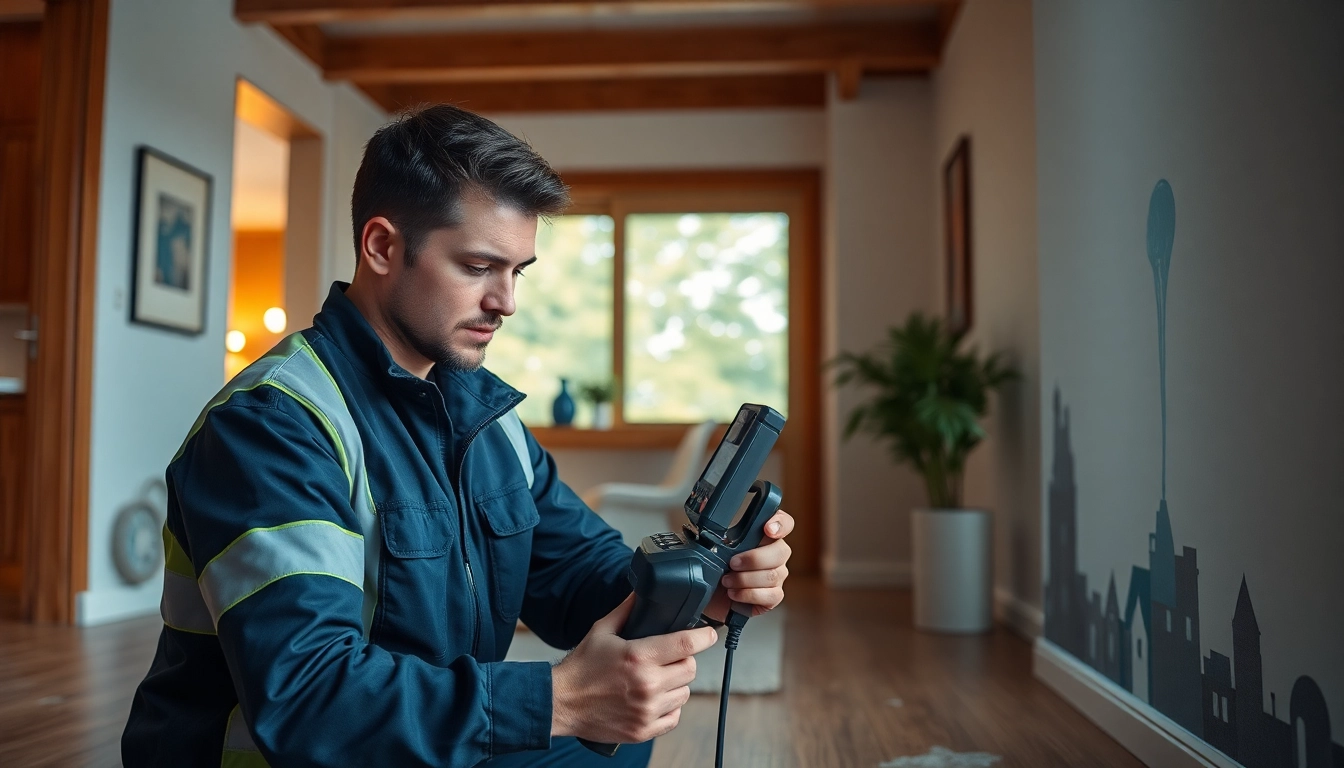Understanding Leak Detection Cornwall Basics
What is Leak Detection Cornwall?
Leak detection is a critical service that aims to identify and address unwanted water leaks in various structures, ranging from residential homes to commercial buildings. In Cornwall, as elsewhere, the presence of hidden leaks can compromise not only the integrity of a property but also increase water bills significantly. By employing specialized technologies and expert knowledge, leak detection professionals can locate these leaks quickly and efficiently. Utilizing methods that cause minimal disruption, the leak detection process is essential for preserving the health and safety of your home or business.
Common Signs of Water Leaks
Identifying water leaks early can save you a considerable amount of money and hassle. Here are some common signs that indicate the possibility of a leak:
- Increased Water Bills: A sudden spike in your water bill without any change in usage can indicate a leak somewhere in your plumbing.
- Water Stains: Stains on walls or ceilings, especially if they are yellow or brownish, can signal a leak above or adjacent to those areas.
- Mold Growth: The presence of mold or mildew can indicate excessive moisture, often a sign of an underlying leak.
- Sound of Running Water: If you hear water running when no fixtures are in use, it could suggest a hidden leak in your plumbing.
- Floor Damage: Warped or buckling floors, especially if they are made of hardwood or laminate, can also indicate leak issues.
Importance of Prompt Leak Detection
Prompt leak detection is vital for several reasons:
- Damage Prevention: Early detection of leaks can prevent significant structural damage to properties.
- Health Risks: Water leaks can create an environment conducive to mold growth, which poses health risks.
- Cost Savings: Identifying and fixing leaks reduces wasted water and lowers utility bills.
- Environmental Conservation: By addressing leaks promptly, we can conserve precious water resources.
Leak Detection Technologies
Modern Equipment Used in Leak Detection Cornwall
Advancements in technology have significantly improved the effectiveness and efficiency of leak detection. Here are some of the modern tools employed in the field:
- Acoustic Listening Devices: These devices amplify the sound of water escaping from pipes, allowing technicians to pinpoint the location of leaks.
- Infrared Cameras: By detecting temperature differences, infrared cameras can help identify moisture intrusion behind walls or under floors.
- Moisture Meters: These instruments measure moisture levels in various materials, assisting in identifying hidden leaks.
- Video Inspection Equipment: Using small cameras inserted into pipes, professionals can visually inspect the interior of plumbing systems for damage or blockages.
Non-Destructive Testing Methods Explained
Non-destructive testing (NDT) methods are crucial in leak detection as they minimize structural damage. Key NDT techniques include:
- Thermal Imaging: Utilizing temperature variations to detect leaks, thermal imaging is non-invasive and efficient.
- Pressure Testing: This method assesses the integrity of plumbing systems without excavation, identifying leaks through pressure changes.
- Tracer Gas Method: This method involves introducing a non-toxic gas into the plumbing system, which can be detected at leak points.
Comparing Traditional vs. Modern Leak Detection Techniques
While traditional leak detection methods such as visual inspection and guesswork are still used, modern technologies provide far superior results. Traditional methods are often time-consuming and may lead to property damage due to unnecessary excavations. In contrast, modern techniques not only save time and reduce costs but also help in preserving the integrity of structures. By employing a blend of traditional wisdom and modern technology, leak detection professionals can offer more effective solutions.
Deciding When to Seek Professional Help
Identifying Major Leak Concerns
It’s vital to recognize when a leak may necessitate professional intervention. Signs that warrant immediate consultation include:
- An unexplained increase in water bills over a brief period.
- Visible damage to property that is causing safety concerns.
- Persistent dampness or moisture that does not resolve over time.
Evaluating Risks of Delayed Leak Detection
Delaying leak detection can lead to considerable consequences. Over time, minor leaks can evolve into major structural issues, resulting in costly repairs, potential hazardous living conditions, and excessive water loss. Not to mention, property insurance may not cover damages resulting from prolonged leaks if they are deemed neglected.
Steps to Take Before Calling a Leak Detection Expert
Before reaching out to a professional, there are steps you can take to prepare:
- Conduct a visual inspection of your property.
- Monitor your water usage and bills for unusual patterns.
- Document any visible signs of leaks, such as water stains or mold growth.
Cost Factors in Leak Detection Cornwall Services
Average Pricing Models Explained
The cost of leak detection services can vary widely based on several factors, including the type of services required, the nature of the leak, and the tools employed by the technician. On average, you can expect to pay for a call-out fee, with additional charges based on the complexity of the job.
Understanding Potential Hidden Costs
While many service providers will offer transparent pricing, hidden costs can sometimes arise, particularly if extensive repairs are necessary after leak detection. Factors that might lead to increased costs include:
- Emergency call-out services after hours.
- Additional repair work required due to extensive damage.
- Costs associated with water damage restoration.
Insurance Considerations for Leak Detection Services
Before hiring a leak detection service, it’s prudent to consult your home insurance policy. Many policies offer coverage for leak-related damages if they are reported timely. Understanding your coverage can save you money and provide peace of mind in case of emergencies.
Preventative Measures and Best Practices
How to Prevent Water Leaks in Your Home
Taking steps to prevent water leaks before they occur can save you significant costs in the long run. Consider the following preventive measures:
- Regularly inspect pipes and fixtures for signs of wear or corrosion.
- Ensure that appliances, such as washing machines, are correctly installed and maintained.
- Protect outdoor hoses from frost damage during colder months.
Maintenance Tips to Minimize Leak Risks
Maintenance is key in preventing leaks. Here are effective tips:
- Schedule regular plumbing inspections with certified professionals.
- Replace old plumbing pipes made from galvanized steel, as they are prone to corrosion.
- Monitor your water meter for unusual usage patterns that might indicate hidden leaks.
Resources for Ongoing Leak Management
Utilizing available resources can help in managing leak risks effectively:
- Install a water detection alarm system that alerts you to potential leaks.
- Utilize building maintenance software to track plumbing inspections and repairs.
- Follow local government resources for plumbing regulations and water conservation tips.




